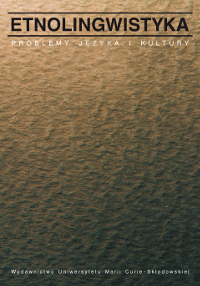Магические парформативы в заговорах и календарных песнях восточных славян
MAGIC PERFORMATIVES IN SPELLS AND SEASONAL SONGS OF EASTERN SLAVS
Author(s): Aleksej V. JudinSubject(s): Anthropology, Language and Literature Studies, Applied Linguistics
Published by: Wydawnictwo Naukowe Uniwersytetu Marii Curie-Sklodowskiej
Keywords: requests; performatives; magic performative texts; prayer; magic
Summary/Abstract: For a religious person, the verbs proszę ‘I’m asking you for’, błagam ‘I’m begging you’ are requests addressed to God or the saints, never a manifestation of the speaker’s will. The same forms, used with a firm belief in their effectiveness in magic spells, serve as performatives: from the point of view of the speaker, the result is a real change in the objective world. By saying obiecuję ‘I promise’ or proszę ‘Pm asking you for’, the speaker does not change the objects of the world but his or her relationships to other people. A performative verbs is not only a word but an action.Magic spells, Christmas carols, spring ‘wishing’ songs (pieśni wółoczebne) are the so called magic performative texts, a term justified by the function of a particular text as a whole. A magic spell need not contain the verbs zaklinam ‘I cast a spell’ or szepczę ‘I am whispering’; similarly, a carol need not contain the verbs pozdrawiam ‘I am greeting (someone)’ or winszuję ‘I wish (someone something’, ‘I congratulate (someone)’. Yet, they remain performative texts if they preserve their intention and function.In the case of orthodox texts or apocryphal prayers used as magic spells, it is impossible to distinguish magic performative texts from religious texts. This is due to an unknown, hidden intention of the speaker: whether the text is a prayer, which may help but need not necessarily be heard, or whether the speaker is a sorcerer convinced that what is being done will be effective. In the former case, a magic spell, which is a text of folklore, proves to be a prayer, and the performatives which it contains are of religious type. In the latter case, a spell appears to be an example of verbal folk magic.The identification of the magic or religious intention of the speaker provides the basis for the recognition of two distinct groups of performative verbs and of whole texts with performative meaning: magic performatives and religious performatives. Both groups stand in opposition to all other verbs and texts because from the point of view of someone convinced of the effectiveness of magic or someone religious, use of words/texts leads to direct changes in the objective world, which depends on the will of the real or presupposed addressee of the utterance, should such an addressee exist.
Journal: Etnolingwistyka. Problemy Języka I Kultury
- Issue Year: 13/2001
- Issue No: 13
- Page Range: 139-148
- Page Count: 10
- Language: Russian

